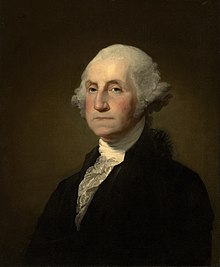
Back Вашингтон, Џьорџь AB George Washington ACE Джордж Вашингтон ADY George Washington AF George Washington ALS ጆርጅ ዋሽንግተን AM George Washington AMI George Washington AN Georgius Washington ANG جورج واشنطن Arabic
George Washington | |
|---|---|
 Portrait c. 1803 | |
| 1st President of the United States | |
| In office April 30, 1789 – March 4, 1797 | |
| Vice President | John Adams |
| Preceded by | Office established |
| Succeeded by | John Adams |
| Commander in Chief of the Continental Army | |
| In office June 19, 1775 – December 23, 1783 | |
| Appointed by | Continental Congress |
| Preceded by | Office established |
| Succeeded by | Henry Knox (as Senior Officer) |
| 14th Chancellor of the College of William & Mary | |
| In office April 30, 1788 – December 14, 1799 | |
| Delegate from Virginia to the Continental Congress | |
| In office September 5, 1774 – June 16, 1775 | |
| Preceded by | Office established |
| Succeeded by | Thomas Jefferson |
| Member of the Virginia House of Burgesses | |
| In office July 24, 1758 – June 24, 1775 | |
| Preceded by | Hugh West |
| Succeeded by | Office abolished |
| Constituency |
|
| Personal details | |
| Born | February 22, 1732[a] Popes Creek, Virginia Colony, British America |
| Died | December 14, 1799 (aged 67) Mount Vernon, Virginia, U.S. |
| Resting place | Mount Vernon, Virginia 38°42′28.4″N 77°05′09.9″W / 38.707889°N 77.086083°W |
| Political party | Independent |
| Spouse | |
| Relatives | Washington family |
| Occupation |
|
| Awards | |
| Signature | |
| Military service | |
| Branch/service | |
| Years of service |
|
| Rank |
|
| Commands |
|
| Battles/wars | See list |
George Washington (February 22, 1732[a] – December 14, 1799) was a Founding Father of the United States, military officer, and planter who served as the first president of the United States from 1789 to 1797. Appointed commander of the Continental Army in 1775, Washington led Patriot forces to victory in the American Revolutionary War. He then served as president of the Constitutional Convention in 1787, which drafted the current Constitution of the United States. Washington has thus become commonly known as the "Father of His Country".
Born in the Colony of Virginia, Washington's first public office was as surveyor of its Culpeper County from 1749 to 1750. In 1752, he became a major in the Virginia Regiment. During the French and Indian War, Washington was promoted to lieutenant colonel and subsequently became head of the Virginia Regiment. He was later elected to the Virginia House of Burgesses and opposed the perceived oppression of the American colonists by the British Crown. He was named a delegate to the Continental Congress in Philadelphia, which appointed him commander-in-chief of the Continental Army at the outbreak of the American Revolutionary War. Washington led Patriot forces to a decisive victory over the British, leading the British to sign the Treaty of Paris acknowledging the independence of the United States.
Washington was twice elected president unanimously by the Electoral College in 1788 and 1792. As the first U.S. president, Washington implemented a strong, well-financed national government while remaining impartial in a fierce rivalry that emerged between cabinet members Thomas Jefferson and Alexander Hamilton. During the French Revolution, he proclaimed a policy of neutrality while sanctioning the Jay Treaty with Great Britain. He set enduring precedents for the office of president, including republicanism, a peaceful transfer of power, the use of the title "Mr. President", and the two-term tradition. His 1796 farewell address became a preeminent statement on republicanism in which he wrote about the importance of national unity and the dangers that regionalism, partisanship, and foreign influence pose to it. As a planter of tobacco and wheat, Washington owned many slaves. He grew to oppose slavery near the end of his lifetime, and provided in his will for the manumission of his slaves.
Washington's image is an icon of American culture. He has been memorialized by monuments, a federal holiday, various media depictions, geographical locations including the national capital, the State of Washington, stamps, and currency. In 1976, Washington was posthumously promoted to the rank of General of the Armies, the highest rank in the U.S. Army. Washington consistently ranks in both popular and scholarly polls as one of the greatest presidents in American history.
Cite error: There are <ref group=lower-alpha> tags or {{efn}} templates on this page, but the references will not show without a {{reflist|group=lower-alpha}} template or {{notelist}} template (see the help page).
- ^ Randall 1997, p. 303.